Germany
Deutschland: Storybook Charm, History, and Innovation
Germany is a fascinating country that offers a delightful blend of cherished traditions, friendly people, and delectable cuisine, not to mention exceptional beers. Explore medieval towns along the scenic Rhine River, with is charming fairytale castles and delight in the picturesque Black Forest in Bavaria. Delve into the culture treasures of Berlin, Munich, and Dresden's must-see museums and be dazzeled by the art pieces commissioned by the aristocracy. Germany has skillfully preserved its traditions, culture, and architectural splendor, and has remarkably restored the country to its former glory after the destruction of World War II. German innovation is apparent throughout the country, especially with their efficient and comfortable high-speed ICE trains. Here are just a few of the many wonderful places you can visit in Germany.
Berlin
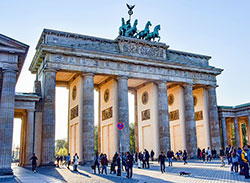
Photo by Nikolaus Bader |
Start your German adventure in the capital city of Berlin, known for its fascinating history and vibrant atmosphere. Visit iconic landmarks like the Brandenburg Gate and the Berlin Wall. With each step, history comes alive, enveloping you in the captivating stories that have shaped Germany. Explore world-class museums on Museum Island, and take a leisurely stroll along the historic Unter den Linden boulevard. Immerse yourself in Berlin's thriving art and music scene, and indulge in its diverse culinary offerings. |
Munich
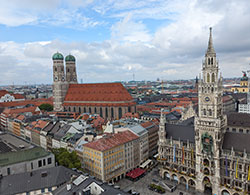
Prakhyath Deshpande / Pexels | Munich, the capital of Bavaria, is renowned for its unique blend of history, culture, and Oktoberfest festivities. Marvel at the architectural wonders of the Nymphenburg Palace, explore the charming streets of the historic center, and visit the world-famous Marienplatz square, home to the iconic Glockenspiel. Don't miss the opportunity to savor Bavarian cuisine and sample the delicious local beers at the famous Hofbräuhaus--a historic beer hall and cultural landmark that has been serving traditional Bavarian food and beer since the 16th century. |
| The Hofbräuhaus is renowned for its lively atmosphere, authentic cuisine, and large beer steins with live music its defintey worth a visit and a great opportunity to interact with the locals. Another must-do is an afternoon stroll through the English Garden, a large park that also has a beer garden that serves great food, with a huge pagada structure and live music. |
The Romantic Road
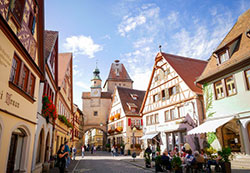
Jiatong Tian / Pexels |
Embark on a scenic journey along the Romantic Road, a picturesque route that winds through charming medieval towns and breathtaking landscapes. Explore the fairy-tale Neuschwanstein Castle, stroll through the cobblestone streets of charming Rothenburg ob der Tauber, and walk atop the walls and enjoy the views, and experience the romantic ambiance of the Würzburg Residence. This enchanting route offers a glimpse into Germany's rich heritage. |
The Rhine Valley
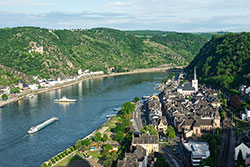
Photo by Claudia Döhring / Pixabay |
Discover the beauty of the Rhine Valley, a UNESCO World Heritage site known for its stunning vineyards, medieval castles, and charming riverside towns. Take a leisurely boat cruise along the Rhine River, passing by iconic landmarks like the Lorelei Rock, and explore towns like Rüdesheim and Bacharach. Enjoy the region's famous Riesling wines and indulge in the local cuisine. |
Black Forest
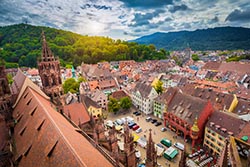
By Bluejayphoto / iStock Photo | Immerse yourself in the natural beauty of the Black Forest region, characterized by dense forests, rolling hills, and picturesque villages.
Begin your journey in Freiburg, a vibrant city with a well-preserved Altstadt (Old Town) featuring colorful half-timbered houses, the majestic Freiburg Minster, and the whimsical Bächle water channels. From there, head to Triberg, renowned for its Black Forest cuckoo clocks and the impressive Triberg Waterfalls. |
| Explore the clock shops and marvel at the cascading waters amidst lush greenery. Don't miss Titisee-Neustadt, a delightful town on the shores of Lake Titisee, where you can enjoy boat trips, browse for Black Forest souvenirs, and savor the iconic Black Forest cake. |
| In Baden-Baden, indulge in the elegance of thermal baths, stroll through manicured gardens, and try your luck at Casino Baden-Baden. Finally, immerse yourself in the medieval charm of Gengenbach and experience the enchantment of its Christmas market. The Black Forest region invites you to discover its unique blend of history, nature, and cultural delights for an unforgettable experience. |
Best Time to Visit:
The best time to visit Germany depends on your personal preferences and the specific experiences you seek. Here is a breakdown of the seasons and what they offer:
Spring (March to May): Spring in Germany brings milder temperatures, blooming flowers, and longer daylight hours. It's an excellent time to visit if you enjoy exploring cities, as the weather is pleasant for walking tours and outdoor activities. You can also witness beautiful cherry blossoms and experience cultural events like Easter markets and festivals.
Summer (June to August): Summer is a popular time to visit Germany, especially for outdoor activities and festivals. The weather is generally warm, and you can enjoy activities like hiking, cycling, and exploring the country's lakes and coastline. Cities come alive with outdoor concerts, beer gardens, and open-air events. However, it can be crowded, especially in tourist hotspots.
Autumn (September to November): Autumn in Germany is characterized by mild temperatures, colorful foliage, and fewer crowds compared to the summer months. It's an ideal time for hiking, wine tours in regions like the Moselle Valley, and visiting cultural sites. Oktoberfest in Munich also takes place in September, attracting visitors from around the world.
Winter (December to February): Germany's winter offers a festive atmosphere with Christmas markets, mulled wine, and holiday decorations. If you enjoy winter sports like skiing or snowboarding, the Bavarian Alps and other mountain regions provide excellent opportunities. Cities like Berlin and Cologne also have their own unique winter charm.
Travel Planning Tips:
Plan Ahead: Before your trip, research the cities, regions, and attractions you wish to visit. Make a list of must-see places and plan your itinerary accordingly. This will help you make the most of your time and ensure you don't miss out on any key experiences.
Cash and Currency: Germany's currency is the Euro (€). Inform your bank about your travel plans to avoid any issues with your cards. Carry some cash for small purchases, as not all places accept cards, especially in rural areas. Familiarize yourself with the tipping customs, as tipping is customary in restaurants and for services such as taxis.
Travel Insurance: Ensure that you have comprehensive travel insurance that covers medical expenses, trip cancellation, and any potential emergencies. Review the policy details and know how to access medical assistance if needed.
Check Visa Requirements: Depending on your nationality, you may need a visa to enter Germany. Check the visa requirements well in advance and apply if necessary. Ensure that your passport is valid for at least six months beyond your planned departure date.
Pack Accordingly: Germany has a temperate climate, so pack clothing suitable for the season of your visit. Don't forget to include comfortable walking shoes, as exploring cities and attractions often involves a fair amount of walking. Pack a universal power adapter for charging your electronic devices.
Basic German Phrases: While many Germans speak English, it's always appreciated when travelers make an effort to speak a few basic phrases in German. For example, Hello can be either "Hallo", or "Guten Tag" (more formal).
Goodbye is "Auf Wiedersehen", (pronounced owf VEE-duh-zayn). Please is "Bitte" (pronounced Bit-tuh) and thank-you is "Danke".
Accommodations:
Hotels: Germany offers a wide range of hotels, from luxury establishments to budget-friendly options. Many hotels cater to retirees by providing amenities such as elevators, accessible rooms, and on-site restaurants. Senior discounts may also be available in certain hotels, so it's worth inquiring about any special rates.
Guesthouses and Bed & Breakfasts: Guesthouses and B&Bs provide a cozy and often more intimate experience. These accommodations are typically run by local hosts who offer personalized service and a homely atmosphere. Retirees who enjoy interacting with locals and experiencing authentic hospitality often find these options appealing.
Spa and Wellness Resorts: Germany is known for its spa and wellness culture, offering numerous wellness resorts with rejuvenating treatments, thermal baths, and relaxation facilities. Retirees seeking relaxation and wellness-focused experiences can choose from a variety of spa resorts located in picturesque regions, such as the Black Forest or Bavarian Alps.
Transportation:
Germany offers a well-developed transportation network, making it convenient to explore the country. Remember to validate train and bus tickets before boarding and always carry a valid ticket during your journey. Additionally, consider using navigation apps or maps for smooth navigation, and check for any service disruptions or schedule changes in advance. Here are some transportation tips:
- Domestic Flights: While trains are the primary mode of long-distance travel, there are regional airlines available for domestic flights within Germany. Lufthansa and Eurowings are the major airlines operating domestic routes. Keep in mind that flying may be more time-efficient for longer distances, but it may not always be cost-effective for shorter journeys.
- Trains: Germany has an extensive train network operated by Deutsche Bahn (DB). Trains are a popular and efficient mode of transportation, connecting major cities and even smaller towns. Consider purchasing a rail pass, such as the Germany Rail Pass, if you plan to travel extensively by train. It's advisable to book tickets in advance, especially for long-distance or high-speed trains.
- Buses: Germany has a well-developed network of buses, particularly for regional and local travel. Companies like FlixBus and MeinFernbus operate extensive bus routes connecting various cities and towns. Buses can be a budget-friendly option, and they offer flexibility for reaching destinations that are not directly accessible by train.
- Rental Cars: If you prefer more flexibility and want to explore rural areas or venture off the beaten path, renting a car is an option. Germany has a well-maintained road network, including the famous Autobahn, but be aware of traffic rules and parking regulations. It's recommended to book a rental car in advance and check for any specific requirements, such as an International Driving Permit.
- Taxis: Taxis in Germany are generally safe and reliable; however it's always recommended to use official, licensed taxis and be cautious when accepting rides from unmarked vehicles. The fare is calculated based on the distance traveled and sometimes includes additional charges for luggage or night-time rides. Taxis in Germany typically accept both cash and credit cards, but it's always good to have some cash on hand for smaller fares or in case of any technical issues. It's common to tip taxi drivers by rounding up the fare or giving a small additional amount as a gesture of appreciation.
- Public Transportation:
Germany's cities have excellent public transportation systems, including buses, trams, and underground/subway trains. Each city has its own ticketing system, but generally, you can purchase tickets at ticket machines or in some cases, from the driver. Consider getting day passes or multi-day passes for unlimited travel within a specific city.
Safety Tips:
- Stay Aware of Your Surroundings: Like any destination, it's important to stay aware of your surroundings, particularly in crowded areas or tourist spots. Be cautious of your belongings and avoid displaying valuable items in public. Keep an eye on your bags, especially in busy transportation hubs or when using public transportation.
- Use Reliable Transportation: Opt for licensed taxis, official transportation services, or reputable ride-hailing apps when getting around. If you're using public transportation, be mindful of your belongings and be aware of any announcements or safety guidelines provided.
- Secure Your Accommodation: Choose reputable accommodations and ensure that your room has proper security measures. Use safes or lockers for storing valuable items. Keep your room locked when you're not present, and use extra caution if you're staying in shared accommodations.
- Be Cautious of Scams: While Germany is generally safe, be aware of common scams that can target tourists. Exercise caution when approached by strangers offering unsolicited help, as they may have ulterior motives. Be skeptical of overly friendly individuals or situations that seem suspicious.
- Health and Hygiene: Germany maintains high health and hygiene standards. However, it's always wise to carry a basic first aid kit with essential medications and any necessary prescriptions. Maintain good hand hygiene and follow any health guidelines or advisories provided during your visit.
- Emergency Contacts: Familiarize yourself with the local emergency contact numbers in Germany, such as 110 for police assistance and 112 for medical emergencies. Keep important contact numbers, including your embassy or consulate, stored in your phone or written down.
- Travel Advisories Stay updated on current events, local regulations, and any travel advisories when traveling abroad. Visit the US Government State Department Travel Advisories web site to check on the status of your destination.
- Enroll in the STEP Program: Travelers are also urged to enroll in the U.S. State Department's Smart Traveler Enrollment Program (STEP) to receive security messages and to make it easier to locate them in an emergency. The Department uses these security messages to convey information about terrorist threats, security incidents, planned demonstrations, natural disasters, etc. In an emergency, please contact the nearest U.S. Embassy or consulate or call the following numbers: 1 (888) 407-4747 (toll-free in the United States and Canada) or 1 (202) 501-4444 from other countries.
| |
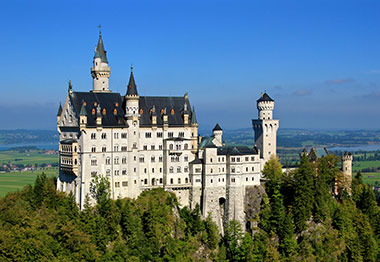 Neuschwanstein Castle Photo by Pascal Borener
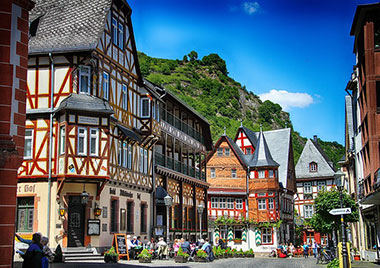 Bacharach on the Rhine Photo by Mschiffm / Pixabay
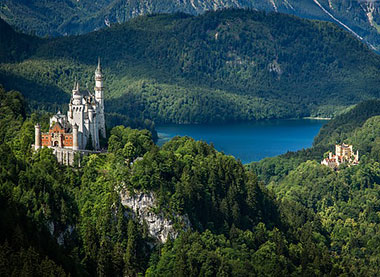 Swan Lake, Bavaria
Photo by Jörg Vieli
|
 Neuschwanstein Castle
Neuschwanstein Castle Bacharach on the Rhine
Bacharach on the Rhine Swan Lake, Bavaria
Swan Lake, Bavaria